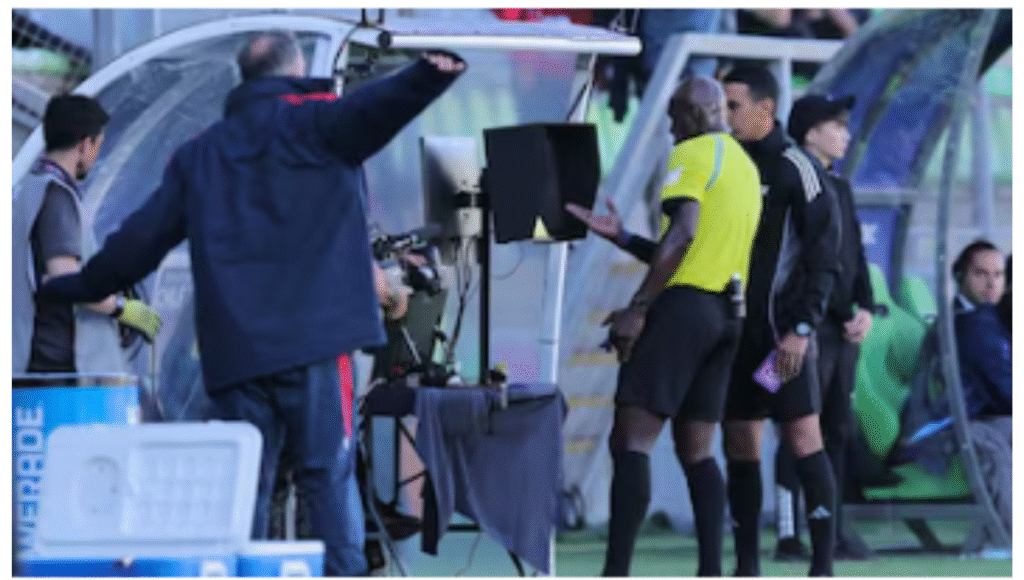
A New Chapter in Football: Historic First FIFA Referee Uses Green Card
Football has always been more than just a game. It’s a world of passion, emotions, and moments that become memories for millions of fans. Over the years, the sport has witnessed many changes — from goal-line technology to the introduction of the Video Assistant Referee (VAR). But now, history has been made again. For the first time ever, a green card has been issued in an official FIFA tournament, sparking conversations about the future of officiating in football.
The Historic Moment in Chile
The groundbreaking moment took place at the 2025 FIFA U-20 World Cup in Chile when referee Augusto Aragon reached into his pocket, not for the familiar yellow or red card, but for a green one. The crowd witnessed history as this new card entered the world’s most beloved sport.
This wasn’t just another disciplinary tool. Instead, the green card was used to signal Football Video Support (VS) — a new system being trialed by FIFA for matches where VAR technology is not available. In a game between Italy and Cuba, the referee used the green card to call for a video review, marking a turning point in football’s officiating history.
What Makes the Green Card Different?
Traditionally, referees rely on yellow and red cards to manage discipline — yellow as a warning, and red for sending a player off. But the green card serves a completely different purpose.
It acts as a trigger for video review, allowing referees to double-check critical decisions such as goals, penalties, or fouls that could alter the course of the game. Managers are given the power to challenge two referee decisions per match, similar to systems used in cricket, tennis, and American football.
This new mechanism ensures that “clear and obvious errors” are minimized, even in tournaments where full VAR setups are not in place. The green card gives both referees and teams an additional layer of fairness and accuracy, ensuring the game remains just as much about skill as it is about justice on the field.
Why the Change Matters
Since the introduction of yellow and red cards at the 1970 World Cup, football has remained largely unchanged in terms of on-field discipline. But as the game grows faster and stakes get higher, mistakes can have a lasting impact.
By bringing in the green card, FIFA is sending a strong message: football is ready to adapt, evolve, and embrace technology to make the sport more transparent and fair for all. This system not only protects referees from unfair criticism but also gives coaches and players confidence that every crucial decision can be properly reviewed.
A Step Toward the Future of Football
The trial at the U-20 World Cup is just the beginning. Similar to how VAR was initially tested in smaller competitions before being rolled out globally, the green card system could soon become a permanent part of the game. Already, it has been tested in other tournaments like the Women’s U-20 World Cup in Colombia and the Blue Stars FIFA Youth Cup, showing FIFA’s determination to refine and expand the process.
Fans may need some time to get used to the sight of referees holding up a green card, but just like VAR, this new change could soon become an integral part of football’s future. Imagine a World Cup final where a green card review saves a team from a wrongly disallowed goal — that’s the kind of impact this innovation can have.
Balancing Tradition and Innovation
Football is a sport that deeply values its traditions, but it has never shied away from change when necessary. From the introduction of substitutes to goal-line technology, every innovation has shaped the modern game. The green card is another step in this journey, proving that football can embrace progress while still preserving its spirit and passion.
Conclusion
The green card is more than just a new piece of equipment in a referee’s pocket. It symbolizes football’s commitment to fairness, accountability, and progress. As the trials continue, fans, players, and referees alike will see just how much this innovation can transform the game we love.
For now, the historic moment in Chile will be remembered as the day when football took another bold step into the future — a future where every decision counts, and fairness is at the heart of the sport.
Disclaimer: This article is based on available reports and official announcements regarding FIFA’s introduction of the green card system at the U-20 World Cup. The information aims to provide clarity and insights, and readers are encouraged to follow FIFA’s official updates for further developments.






